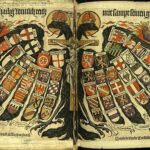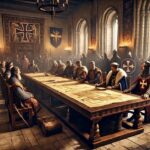German history is a fascinating journey through centuries of cultural, political, and economic developments. From the establishment of the Holy Roman Empire to the rise and fall of the Berlin Wall, Germany’s rich past has shaped not only its own destiny but also the course of European history. In this article, we delve into the key events and milestones of German history, exploring its impact on the world stage. Join us as we embark on this exploration of German history.
- The Holy Roman Empire: The Birth of a Nation
The German nation traces its roots back to the Holy Roman Empire, which emerged in the Middle Ages. The empire, which lasted from 962 to 1806, encompassed vast territories across central Europe, solidifying the German identity and laying the foundation for future German states. The Holy Roman Empire played a significant role in shaping the political, cultural, and religious landscape of medieval Europe.
- The Reformation and the Thirty Years’ War
During the 16th century, Germany witnessed the advent of the Protestant Reformation led by Martin Luther. This movement challenged the authority of the Catholic Church and sparked a wave of religious reforms across the German states. The subsequent Thirty Years’ War (1618-1648) devastated the region, leading to widespread destruction and loss of life.
- Prussia and German Unification
The 19th century saw the rise of Prussia as a dominant force in German politics. Under the leadership of Otto von Bismarck, Prussia successfully unified the fragmented German states into a single nation-state. The formation of the German Empire in 1871 marked a significant milestone in German history, establishing Germany as a major European power.
- World War I and the Weimar Republic
The aftermath of World War I brought significant challenges to Germany. The Treaty of Versailles imposed harsh reparations on Germany, leading to economic turmoil and political instability. The Weimar Republic, established in 1919, faced numerous internal struggles and ultimately gave way to the rise of Adolf Hitler and the Nazi Party.
- World War II and the Division of Germany
World War II engulfed Germany in a devastating conflict that resulted in immense human suffering and the Holocaust. Nazi Germany’s aggression led to the division of Germany after the war, with the eastern part falling under Soviet control and the western part under Allied occupation. The construction of the Berlin Wall in 1961 further symbolized the Cold War division of Germany.
- The Fall of the Berlin Wall and German Reunification
The fall of the Berlin Wall in 1989 marked a pivotal moment in German and European history. The reunification of East and West Germany in 1990 signaled the end of the Cold War era and the birth of a unified Germany. This event served as a symbol of hope and reconciliation, demonstrating Germany’s ability to overcome its troubled past.
German history is a tapestry woven with tales of empires, conflicts, and resilience. From the Holy Roman Empire to the fall of the Berlin Wall, Germany’s journey has had a profound impact on European history. By understanding the trials and triumphs of the past, we gain insights into the complexities of the present and hope for a better future. Explore the depths of German history and unravel the stories that have shaped this remarkable nation.
 “Aryanization” of Germany in 1933 and mass book burning - By Dorothea von Schwanenfluegel Lawson Here are some behind-the-scene personal experiences from the 1930’s that might be of interest. In 1933, our Nazi government appealed to us for a nationwide “non-Aryan” boycott. I experienced the proposed boycott the hard way. One day I went to the local haberdashery I had been frequenting for years, a […]
“Aryanization” of Germany in 1933 and mass book burning - By Dorothea von Schwanenfluegel Lawson Here are some behind-the-scene personal experiences from the 1930’s that might be of interest. In 1933, our Nazi government appealed to us for a nationwide “non-Aryan” boycott. I experienced the proposed boycott the hard way. One day I went to the local haberdashery I had been frequenting for years, a […] The Night Watchman Tour in Rothenburg: A Journey Through Time - Rothenburg ob der Tauber, with its medieval charm and picturesque streets, is one of the best-preserved towns in Germany. When twilight descends upon this romantic town, and the hordes of daytime tourists disperse, the Night Watchman emerges, lantern in hand, to guide you through a journey of Rothenburg’s rich history. If you’re planning a visit […]
The Night Watchman Tour in Rothenburg: A Journey Through Time - Rothenburg ob der Tauber, with its medieval charm and picturesque streets, is one of the best-preserved towns in Germany. When twilight descends upon this romantic town, and the hordes of daytime tourists disperse, the Night Watchman emerges, lantern in hand, to guide you through a journey of Rothenburg’s rich history. If you’re planning a visit […]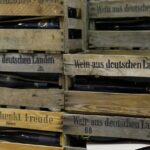 A Sip Through Time: Unveiling the Fascinating History of German Wine - The story of German wine is a captivating journey through centuries of tradition, craftsmanship, and innovation. From the rolling vineyards along the Rhine and Mosel rivers to the quaint winemaking villages nestled in the valleys, Germany has been an integral part of the wine world for over a millennium. In this article, we explore the […]
A Sip Through Time: Unveiling the Fascinating History of German Wine - The story of German wine is a captivating journey through centuries of tradition, craftsmanship, and innovation. From the rolling vineyards along the Rhine and Mosel rivers to the quaint winemaking villages nestled in the valleys, Germany has been an integral part of the wine world for over a millennium. In this article, we explore the […]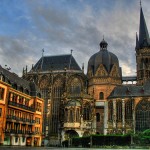 Aachen Cathedral - Aachen Cathedral was included into UNESCO World Heritage List in 1978 and got one of the top sites of the list due its unique history enriched by legends and myths and luxurious treasures kept in the cathedral. Construction of this palatine chapel, with its octagonal basilica and cupola, began c. 790–800 under the Emperor Charlemagne. […]
Aachen Cathedral - Aachen Cathedral was included into UNESCO World Heritage List in 1978 and got one of the top sites of the list due its unique history enriched by legends and myths and luxurious treasures kept in the cathedral. Construction of this palatine chapel, with its octagonal basilica and cupola, began c. 790–800 under the Emperor Charlemagne. […] Architecture in Germany - Architecture in Germany has been greatly influenced by the styles in architecture and art of European countries. These styles were born and developed during ancient period of Charlemagne’s Empire to the modern history after the World War II. The most ancient architectural designs appeared since 800 AD when German architecture was featured by the mosaics, […]
Architecture in Germany - Architecture in Germany has been greatly influenced by the styles in architecture and art of European countries. These styles were born and developed during ancient period of Charlemagne’s Empire to the modern history after the World War II. The most ancient architectural designs appeared since 800 AD when German architecture was featured by the mosaics, […]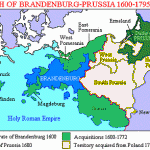 Austria and Prussia - The most important German power after the Peace of Westphalia was Austria, followed by a few other states with much smaller populations, most notably Brandenburg, Saxony, and Bavaria. Austria retained its preeminence until the second half of the nineteenth century, but in the eighteenth century Brandenburg had become a serious rival, annexing valuable Austrian territory. […]
Austria and Prussia - The most important German power after the Peace of Westphalia was Austria, followed by a few other states with much smaller populations, most notably Brandenburg, Saxony, and Bavaria. Austria retained its preeminence until the second half of the nineteenth century, but in the eighteenth century Brandenburg had become a serious rival, annexing valuable Austrian territory. […]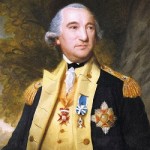 Baron von Steuben - How about getting couple of centuries back into the colonial America? Let us have a look at the American struggle for independence and learn about the crucial role of the German General von Steuben in it. Born in Magdeburg, Prussia, Friedrich Wilhelm Augustus von Steuben became a soldier at 16 and served under Frederick the […]
Baron von Steuben - How about getting couple of centuries back into the colonial America? Let us have a look at the American struggle for independence and learn about the crucial role of the German General von Steuben in it. Born in Magdeburg, Prussia, Friedrich Wilhelm Augustus von Steuben became a soldier at 16 and served under Frederick the […] Bauhaus School - The beginning and the goals of Bauhaus Bauhaus: [Ger., lit. “architecture house”, from Bau = building (bauen=to build) + Haus = house.] Contemporary German architecture set its main trends in the first thirty years of the 20th century. The strongest influences came from Weimar and Dessau, where the Bauhaus school was founded in 1919. Under […]
Bauhaus School - The beginning and the goals of Bauhaus Bauhaus: [Ger., lit. “architecture house”, from Bau = building (bauen=to build) + Haus = house.] Contemporary German architecture set its main trends in the first thirty years of the 20th century. The strongest influences came from Weimar and Dessau, where the Bauhaus school was founded in 1919. Under […]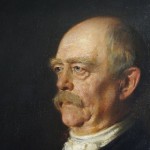 Bismarck and the Unification of Germany - Liberal hopes for German unification were not met during the politically turbulent 1848-49 period. A Prussian plan for a smaller union was dropped in late 1850 after Austria threatened Prussia with war. Despite this setback, desire for some kind of German unity, either with or without Austria, grew during the 1850s and 1860s. It was […]
Bismarck and the Unification of Germany - Liberal hopes for German unification were not met during the politically turbulent 1848-49 period. A Prussian plan for a smaller union was dropped in late 1850 after Austria threatened Prussia with war. Despite this setback, desire for some kind of German unity, either with or without Austria, grew during the 1850s and 1860s. It was […]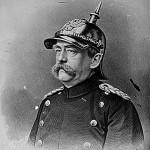 Bismarck’s Foreign Policy - The crash of 1873 and the subsequent depression began the gradual dissolution of Bismarck‘s alliance with the National Liberals that had begun after his triumphs of 1866. In the late 1870s, Bismarck began negotiations with the economically protectionist Conservative Party and Center Party toward the formation of a new government coalition. Conservative electoral gains and […]
Bismarck’s Foreign Policy - The crash of 1873 and the subsequent depression began the gradual dissolution of Bismarck‘s alliance with the National Liberals that had begun after his triumphs of 1866. In the late 1870s, Bismarck began negotiations with the economically protectionist Conservative Party and Center Party toward the formation of a new government coalition. Conservative electoral gains and […]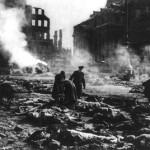 Bombings and air-raids during WWII - By Dorothea von Schwanenfluegel Lawson I would like to share with you one more episode of my life. Let’s fast-forward to Berlin. The year is 1944. Bombings had become the order of the day & so had air raids. In April, our suburb was under attack & bombs were detonating everywhere with earsplitting blasts as […]
Bombings and air-raids during WWII - By Dorothea von Schwanenfluegel Lawson I would like to share with you one more episode of my life. Let’s fast-forward to Berlin. The year is 1944. Bombings had become the order of the day & so had air raids. In April, our suburb was under attack & bombs were detonating everywhere with earsplitting blasts as […] Common Genealogical Terms for German Ancestry Research - Genealogy, the study of family history and lineage, is a fascinating journey into the past. For those exploring German ancestry, understanding specific genealogical terms can greatly enhance the research process. This comprehensive guide will delve into common German genealogical terms, providing insights and explanations to assist both novice and experienced researchers. From vital records to […]
Common Genealogical Terms for German Ancestry Research - Genealogy, the study of family history and lineage, is a fascinating journey into the past. For those exploring German ancestry, understanding specific genealogical terms can greatly enhance the research process. This comprehensive guide will delve into common German genealogical terms, providing insights and explanations to assist both novice and experienced researchers. From vital records to […]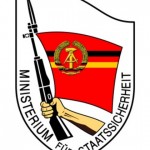 Consolidation of the New State - The most important instrument employed by East German authorities to guarantee their absolute rule was the State Security Service (Staatssicherheitsdienst, commonly referred to as the Stasi). Founded in early 1950 as the secret service branch of the Ministry for State Security (Ministerium fuer Staatssicherheit–MfS), the Stasi came to exercise almost complete control over the population […]
Consolidation of the New State - The most important instrument employed by East German authorities to guarantee their absolute rule was the State Security Service (Staatssicherheitsdienst, commonly referred to as the Stasi). Founded in early 1950 as the secret service branch of the Ministry for State Security (Ministerium fuer Staatssicherheit–MfS), the Stasi came to exercise almost complete control over the population […]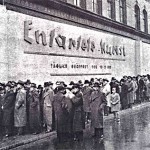 Degenerate Art – “Entartete Kunst” - In 1937 in Munich the Nazis held an art exhibition of what they called Entartete Kunst, or Degenerate Art. The purpose of the exhibition was to let the Germans know that some forms and pieces of art were not accepted by the “highest race”, and this art is “degenerate”, also called as Jewish or Bolshevistic. […]
Degenerate Art – “Entartete Kunst” - In 1937 in Munich the Nazis held an art exhibition of what they called Entartete Kunst, or Degenerate Art. The purpose of the exhibition was to let the Germans know that some forms and pieces of art were not accepted by the “highest race”, and this art is “degenerate”, also called as Jewish or Bolshevistic. […]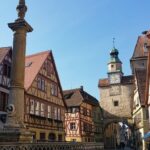 Discover Timeless Wonders: The Imperial City Museum in Rothenburg - Nestled within the fairy-tale walls of Rothenburg ob der Tauber, the Imperial City Museum (Reichsstadtmuseum) stands as a sentinel to history, culture, and art. A testament to the town’s medieval glory, the museum invites visitors to step back in time and explore the splendors of an era long gone yet preserved within its storied halls. […]
Discover Timeless Wonders: The Imperial City Museum in Rothenburg - Nestled within the fairy-tale walls of Rothenburg ob der Tauber, the Imperial City Museum (Reichsstadtmuseum) stands as a sentinel to history, culture, and art. A testament to the town’s medieval glory, the museum invites visitors to step back in time and explore the splendors of an era long gone yet preserved within its storied halls. […]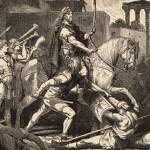 Early History of Germany - What do Roman emperors, ancient tribal alliances, and medieval power plays have in common? They all helped shape what we now know as Germany. The Early History of Germany is a riveting saga of cultural fusion, fierce independence, and geopolitical drama that laid the foundations for a modern European powerhouse. In this article, we’ll take […]
Early History of Germany - What do Roman emperors, ancient tribal alliances, and medieval power plays have in common? They all helped shape what we now know as Germany. The Early History of Germany is a riveting saga of cultural fusion, fierce independence, and geopolitical drama that laid the foundations for a modern European powerhouse. In this article, we’ll take […]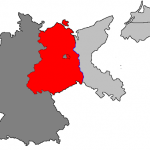 East Germany - What is ‘East Germany’? This question arises not just from political background of the country, but historical, too. Postwar society used to name Soviet GDR as ‘East Germany’: lands of Prussia, Silesia and Pomerania belonged to former GDR and located in the east of the Oder. Historically these lands were inhabited by Germans, but after […]
East Germany - What is ‘East Germany’? This question arises not just from political background of the country, but historical, too. Postwar society used to name Soviet GDR as ‘East Germany’: lands of Prussia, Silesia and Pomerania belonged to former GDR and located in the east of the Oder. Historically these lands were inhabited by Germans, but after […]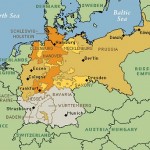 Economic and Political Trends in Germany Toward Unification - It was not possible for Metternich and his allies to suppress completely the desire for liberal reforms, including the establishment of constitutional parliamentary government, economic freedom, and civil liberties. Some of these reforms had already been under discussion during the eighteenth-century Enlightenment, and awareness of their desirability had spread during the Napoleonic era. In addition, […]
Economic and Political Trends in Germany Toward Unification - It was not possible for Metternich and his allies to suppress completely the desire for liberal reforms, including the establishment of constitutional parliamentary government, economic freedom, and civil liberties. Some of these reforms had already been under discussion during the eighteenth-century Enlightenment, and awareness of their desirability had spread during the Napoleonic era. In addition, […] Fascinating World of Medieval Justice at the Medieval Crime Museum in Rothenburg ob der Tauber - The Medieval Crime Museum (Mittelalterliches Kriminalmuseum) in Rothenburg ob der Tauber is a gateway to the arcane world of medieval justice. Nestled within the well-preserved walls of this iconic Bavarian town, the museum offers a deep dive into the legal systems, penal codes, and social norms that governed Europe during the Middle Ages. This comprehensive […]
Fascinating World of Medieval Justice at the Medieval Crime Museum in Rothenburg ob der Tauber - The Medieval Crime Museum (Mittelalterliches Kriminalmuseum) in Rothenburg ob der Tauber is a gateway to the arcane world of medieval justice. Nestled within the well-preserved walls of this iconic Bavarian town, the museum offers a deep dive into the legal systems, penal codes, and social norms that governed Europe during the Middle Ages. This comprehensive […]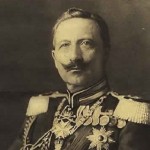 Foreign Policy in the Wilhelmine Era - Foreign policy in the Wilhelmine Era (1890-1914) turned away from Bismarck’s cautious diplomacy of the 1871-90 period. It was also marked by a shrill aggressiveness. Brusque, clumsy diplomacy was backed by increased armaments production, most notably the creation of a large fleet of battleships capable of challenging the British navy. This new bellicosity alarmed the […]
Foreign Policy in the Wilhelmine Era - Foreign policy in the Wilhelmine Era (1890-1914) turned away from Bismarck’s cautious diplomacy of the 1871-90 period. It was also marked by a shrill aggressiveness. Brusque, clumsy diplomacy was backed by increased armaments production, most notably the creation of a large fleet of battleships capable of challenging the British navy. This new bellicosity alarmed the […]- German History Timeline - References: A Country Study. US Library of Congress Country Studies You might also like: All Facts About Germany: A Comprehensive Guide to the… Common Genealogical Terms for German Ancestry Research A Journey Through German Cuisine: A Feast of Tradition and… Unraveling the Mystery: The Battle of the Teutoburg Forest Germany vs USA: Which Country is Better? […]
 German History: From the Holy Roman Empire to the Modern Era - German history is a fascinating journey through centuries of cultural, political, and economic developments. From the establishment of the Holy Roman Empire to the rise and fall of the Berlin Wall, Germany’s rich past has shaped not only its own destiny but also the course of European history. In this article, we delve into the […]
German History: From the Holy Roman Empire to the Modern Era - German history is a fascinating journey through centuries of cultural, political, and economic developments. From the establishment of the Holy Roman Empire to the rise and fall of the Berlin Wall, Germany’s rich past has shaped not only its own destiny but also the course of European history. In this article, we delve into the […]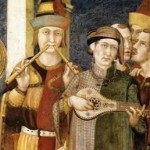 German Minnesingers - Like in many other European cultures German poetry and music were derived from medieval ages of single performers whose life has enriched the pool of national legends and myths: it is not doubt that everyone has heard about minstrels and minnesingers who inspired their audience with romantic world of never-ending love and devotion, patriotism and […]
German Minnesingers - Like in many other European cultures German poetry and music were derived from medieval ages of single performers whose life has enriched the pool of national legends and myths: it is not doubt that everyone has heard about minstrels and minnesingers who inspired their audience with romantic world of never-ending love and devotion, patriotism and […] German Mysteries – the Mirror of German Culture and History - Lots of mysterious legends and myths have sprung up throughout the centuries on German lands. All of these fairy-tales and true stories have influenced German culture – art and literature – and enriched German history by portraying German streets, cities, castles and palaces as magical and mysterious buildings and places. One of the mysterious creatures […]
German Mysteries – the Mirror of German Culture and History - Lots of mysterious legends and myths have sprung up throughout the centuries on German lands. All of these fairy-tales and true stories have influenced German culture – art and literature – and enriched German history by portraying German streets, cities, castles and palaces as magical and mysterious buildings and places. One of the mysterious creatures […] German Reunification: Bored or Happy? - On October 3, Germany celebrates its Unification Day (Tag der Deutschen Einheit). This day back in 1990 brought a happy and a very significant event on the world political scene. The symbol of the Cold War – the Berlin Wall – was torn down, and East Germans could freely face the world. To have a […]
German Reunification: Bored or Happy? - On October 3, Germany celebrates its Unification Day (Tag der Deutschen Einheit). This day back in 1990 brought a happy and a very significant event on the world political scene. The symbol of the Cold War – the Berlin Wall – was torn down, and East Germans could freely face the world. To have a […]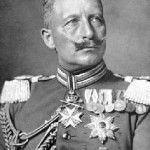 German Women and 3 K’s - German women in the past and Kaiser’s neat definition of the women’s role in a society Back in the 19th century, Kaiser Wilhelm II defined a role for women (later taken over by the Nazis) as “Kirche, Küche, Kinder” (church, kitchen, children.) This definition could only appear in such a country as Germany where the […]
German Women and 3 K’s - German women in the past and Kaiser’s neat definition of the women’s role in a society Back in the 19th century, Kaiser Wilhelm II defined a role for women (later taken over by the Nazis) as “Kirche, Küche, Kinder” (church, kitchen, children.) This definition could only appear in such a country as Germany where the […]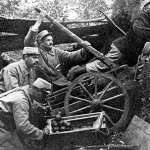 Germany in World War I - Germany’s leadership had hoped for a limited war between Austria-Hungary and Serbia. But because Russian forces had been mobilized in support of Serbia, the German leadership made the decision to support its ally. The Schlieffen Plan, based on the assumption that Germany would face a two-front war because of a French-Russian alliance, required a rapid […]
Germany in World War I - Germany’s leadership had hoped for a limited war between Austria-Hungary and Serbia. But because Russian forces had been mobilized in support of Serbia, the German leadership made the decision to support its ally. The Schlieffen Plan, based on the assumption that Germany would face a two-front war because of a French-Russian alliance, required a rapid […]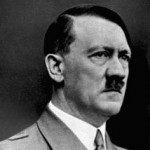 Germany Under Hitler and the Nazi - Nationalism is an infantile idea. It is a measles of mankind. —Albert Einstein The stars must have been in a special position above the Austrian town Braunau on April 20, 1889, when Adolf Hitler was born. Neither his father Alois Schickelgruber Hitler whom Adolf hated, nor his mother Klara Poelzl whom he, to the contrary, […]
Germany Under Hitler and the Nazi - Nationalism is an infantile idea. It is a measles of mankind. —Albert Einstein The stars must have been in a special position above the Austrian town Braunau on April 20, 1889, when Adolf Hitler was born. Neither his father Alois Schickelgruber Hitler whom Adolf hated, nor his mother Klara Poelzl whom he, to the contrary, […]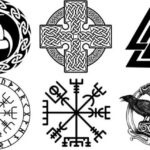 Germany’s Pagan Past: How Ancient Germanic Tribes Lived and Worshipped - Before Germany became the land of castles, beer halls, and high-speed highways, it was a vast wilderness ruled by fierce Germanic tribes who lived in harmony with nature and worshipped powerful gods. Long before Christianity took root, these ancient peoples had their own beliefs, rituals, and way of life—one deeply connected to the forests, rivers, […]
Germany’s Pagan Past: How Ancient Germanic Tribes Lived and Worshipped - Before Germany became the land of castles, beer halls, and high-speed highways, it was a vast wilderness ruled by fierce Germanic tribes who lived in harmony with nature and worshipped powerful gods. Long before Christianity took root, these ancient peoples had their own beliefs, rituals, and way of life—one deeply connected to the forests, rivers, […] Helmut Schmidt - Following Brandt’s resignation in May 1974, the SPD-FDP coalition partners unanimously agreed that Minister of Finance Helmut Schmidt should head the new government. At fifty-five, Helmut Schmidt became the youngest chancellor of the FRG. Born in Hamburg in 1918, he served as an officer in World War II. After the war, he joined the SPD […]
Helmut Schmidt - Following Brandt’s resignation in May 1974, the SPD-FDP coalition partners unanimously agreed that Minister of Finance Helmut Schmidt should head the new government. At fifty-five, Helmut Schmidt became the youngest chancellor of the FRG. Born in Hamburg in 1918, he served as an officer in World War II. After the war, he joined the SPD […] Hitler and the Rise of National Socialism - Adolf Hitler was born in the Austrian border town of Braunau am Inn in 1889. When he was seventeen, he was refused admission to the Vienna Art Academy, having been found insufficiently talented. He remained in Vienna, however, where he led a bohemian existence, acquiring an ideology based on belief in a German master race […]
Hitler and the Rise of National Socialism - Adolf Hitler was born in the Austrian border town of Braunau am Inn in 1889. When he was seventeen, he was refused admission to the Vienna Art Academy, having been found insufficiently talented. He remained in Vienna, however, where he led a bohemian existence, acquiring an ideology based on belief in a German master race […]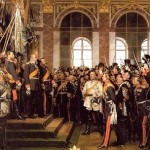 Imperial Germany – the Second Reich - The German Empire–often called the Second Reich to distinguish it from the First Reich, established by Charlemagne in 800–was based on two compromises. The first was between the king of Prussia and the rulers of the other German states, who agreed to accept him as the Kaiser (emperor) of a united Germany, provided they could […]
Imperial Germany – the Second Reich - The German Empire–often called the Second Reich to distinguish it from the First Reich, established by Charlemagne in 800–was based on two compromises. The first was between the king of Prussia and the rulers of the other German states, who agreed to accept him as the Kaiser (emperor) of a united Germany, provided they could […] Intrigue and Mystery of the Amber Room - The mystery of what is generally considered to be the greatest of the missing treasures of Europe – the Amber Room – is still unsolved. However, Europe does not give up, and the searches continue… The Amber Room is surely one of the most original and – since its disappearance in 1944 in the aftermath […]
Intrigue and Mystery of the Amber Room - The mystery of what is generally considered to be the greatest of the missing treasures of Europe – the Amber Room – is still unsolved. However, Europe does not give up, and the searches continue… The Amber Room is surely one of the most original and – since its disappearance in 1944 in the aftermath […]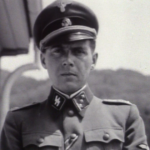 Josef Mengele – the Infamous Nazi Doctor - Some readers may accuse such action to place an article about the person who brought great shame and shadow to German history into the ‘Famous People’ link. But Dr. Josef Mengele was one of the most infamous persons in German history and everybody must remember his name in order to prevent the horror in a […]
Josef Mengele – the Infamous Nazi Doctor - Some readers may accuse such action to place an article about the person who brought great shame and shadow to German history into the ‘Famous People’ link. But Dr. Josef Mengele was one of the most infamous persons in German history and everybody must remember his name in order to prevent the horror in a […]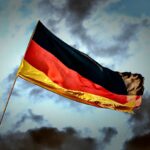 Lost German Kingdoms: Forgotten States and Their Cultural Influence - Germany, as we know it today, is a product of centuries of political fragmentation, shifting borders, and unification efforts. Before Germany became a single nation-state in 1871, it was home to numerous kingdoms, duchies, principalities, and free cities. While some of these states merged into modern Germany, their cultural influence still lingers in architecture, traditions, […]
Lost German Kingdoms: Forgotten States and Their Cultural Influence - Germany, as we know it today, is a product of centuries of political fragmentation, shifting borders, and unification efforts. Before Germany became a single nation-state in 1871, it was home to numerous kingdoms, duchies, principalities, and free cities. While some of these states merged into modern Germany, their cultural influence still lingers in architecture, traditions, […]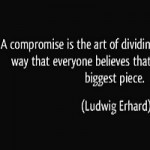 Ludwig Erhard and the Grand Coalition - Konrad Adenauer assumed the chancellorship of the newly founded FRG in 1949, at the age of seventy-three. From the beginning, his primary foreign policy goals had been the achievement of German reunification through a policy of strength, the building of strong relations with the United States, and reconciliation with France. Until the elections of 1961, […]
Ludwig Erhard and the Grand Coalition - Konrad Adenauer assumed the chancellorship of the newly founded FRG in 1949, at the age of seventy-three. From the beginning, his primary foreign policy goals had been the achievement of German reunification through a policy of strength, the building of strong relations with the United States, and reconciliation with France. Until the elections of 1961, […]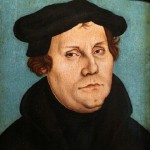 Martin Luther - On the eve of All Saints’ Day in 1517, Martin Luther, a professor of theology at Wittenberg University in Saxony, posted ninety-five theses on a church door. Luther’s primary concern was the sale of indulgences–papal grants of reduced punishment in the afterlife, including releases from purgatory. First written in Latin, the theses were soon translated […]
Martin Luther - On the eve of All Saints’ Day in 1517, Martin Luther, a professor of theology at Wittenberg University in Saxony, posted ninety-five theses on a church door. Luther’s primary concern was the sale of indulgences–papal grants of reduced punishment in the afterlife, including releases from purgatory. First written in Latin, the theses were soon translated […]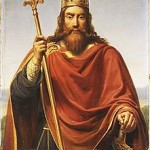 Medieval Germany – The Merovingian Dynasty, ca. 500-751 - The Merovingian Dynasty, reigning from approximately 500 to 751, is often heralded as the foundational ruling family of medieval Germany and much of Western Europe. This article delves into the origins, significant achievements, and enduring legacy of the Merovingians, whose influence was instrumental in shaping the early medieval landscape. Origins and Rise to Power The […]
Medieval Germany – The Merovingian Dynasty, ca. 500-751 - The Merovingian Dynasty, reigning from approximately 500 to 751, is often heralded as the foundational ruling family of medieval Germany and much of Western Europe. This article delves into the origins, significant achievements, and enduring legacy of the Merovingians, whose influence was instrumental in shaping the early medieval landscape. Origins and Rise to Power The […] Nazi and Bauhaus School - The end of Bauhaus The Nazi majority of Dessau suspended the seat of learning. Paul Schultze-Naumburg was the architect that they sent into the school to re-establish pure German art instead of the “cosmopolitan rubbish” the Bauhaus artists were doing. He described Bauhaus furniture as Kisten, or boxes. Bauhaus was even as private institution so […]
Nazi and Bauhaus School - The end of Bauhaus The Nazi majority of Dessau suspended the seat of learning. Paul Schultze-Naumburg was the architect that they sent into the school to re-establish pure German art instead of the “cosmopolitan rubbish” the Bauhaus artists were doing. He described Bauhaus furniture as Kisten, or boxes. Bauhaus was even as private institution so […] Nazi Gold - To finance such a war as World War II, Germany had to be an enormously rich country, … but it wasn’t. The level of the Reichsbank’s gold reserves was extremely low by the beginning of the war. However Germany successfully sustained its war efforts by purchasing necessary war materials from the neutral countries like Argentina, […]
Nazi Gold - To finance such a war as World War II, Germany had to be an enormously rich country, … but it wasn’t. The level of the Reichsbank’s gold reserves was extremely low by the beginning of the war. However Germany successfully sustained its war efforts by purchasing necessary war materials from the neutral countries like Argentina, […]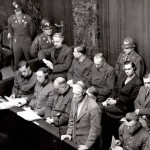 Nazi Nightmares - Nazi doctors carried out direct medical killings as part of “life unworthy of life” policy, as well as deathly experiments on concentration camp prisoners. German doctors were forced to do that according to the Nazi medical decisions. There were two racial programs which directed the entire work of the German physicians of that time: – […]
Nazi Nightmares - Nazi doctors carried out direct medical killings as part of “life unworthy of life” policy, as well as deathly experiments on concentration camp prisoners. German doctors were forced to do that according to the Nazi medical decisions. There were two racial programs which directed the entire work of the German physicians of that time: – […]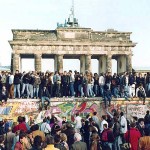 Opening of the Berlin Wall and Unification - November 9, 1989 will be remembered as one of the great moments of German history. On that day, the dreadful Berlin Wall, which for twenty-eight years had been the symbol of German division, cutting through the heart of the old capital city, was unexpectedly opened by GDR border police. In joyful disbelief, Germans from both […]
Opening of the Berlin Wall and Unification - November 9, 1989 will be remembered as one of the great moments of German history. On that day, the dreadful Berlin Wall, which for twenty-eight years had been the symbol of German division, cutting through the heart of the old capital city, was unexpectedly opened by GDR border police. In joyful disbelief, Germans from both […]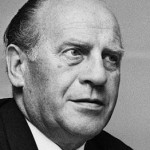 Oskar Schindler - We all know the story of Oskar Schindler from Steven Spielberg’s Academy Award-winning film Schindler’s List. Oskar Schindler was a remarkable man who miraculously saved more than 1,200 Jews from the gas chambers. He did what nobody else did in those scary times of death camps and mass murder. He was all that stood between his […]
Oskar Schindler - We all know the story of Oskar Schindler from Steven Spielberg’s Academy Award-winning film Schindler’s List. Oskar Schindler was a remarkable man who miraculously saved more than 1,200 Jews from the gas chambers. He did what nobody else did in those scary times of death camps and mass murder. He was all that stood between his […]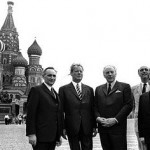 Ostpolitik in Germany - West Germany’s relations with the East European states had virtually stagnated since the establishment of the Hallstein Doctrine in the mid-1950s. In 1970, in an attempt to lessen tensions in Europe, Brandt and his FDP minister for foreign affairs, Walter Scheel, agreed to negotiate with the communist bloc. For the first time since 1948, the […]
Ostpolitik in Germany - West Germany’s relations with the East European states had virtually stagnated since the establishment of the Hallstein Doctrine in the mid-1950s. In 1970, in an attempt to lessen tensions in Europe, Brandt and his FDP minister for foreign affairs, Walter Scheel, agreed to negotiate with the communist bloc. For the first time since 1948, the […] Otto von Bismarck: The Iron Chancellor Who Forged a Nation - Imagine a single man so powerful and cunning that he could bend the fate of an entire continent. A political chessmaster who engineered wars, shaped ideologies, and unified a fragmented collection of states into a global powerhouse—all while wearing a spiked helmet. That man was Otto von Bismarck, the “Iron Chancellor,” and his story is […]
Otto von Bismarck: The Iron Chancellor Who Forged a Nation - Imagine a single man so powerful and cunning that he could bend the fate of an entire continent. A political chessmaster who engineered wars, shaped ideologies, and unified a fragmented collection of states into a global powerhouse—all while wearing a spiked helmet. That man was Otto von Bismarck, the “Iron Chancellor,” and his story is […]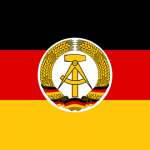 Planned Economy in GDR - In the GDR, as in the other new “people’s republics,” the authorities’ goal of abolishing private property and every trace of capitalism was to be implemented in several steps. By taking possession of all resources, as well as of the means of production and distribution, the socialist state hoped to be able to compete successfully […]
Planned Economy in GDR - In the GDR, as in the other new “people’s republics,” the authorities’ goal of abolishing private property and every trace of capitalism was to be implemented in several steps. By taking possession of all resources, as well as of the means of production and distribution, the socialist state hoped to be able to compete successfully […]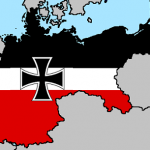 Political Parties in Imperial Germany - The German Empire–often called the Second Reich to distinguish it from the First Reich, established by Charlemagne in 800–was based on two compromises. The first was between the king of Prussia and the rulers of the other German states, who agreed to accept him as the Kaiser (emperor) of a united Germany, provided they could […]
Political Parties in Imperial Germany - The German Empire–often called the Second Reich to distinguish it from the First Reich, established by Charlemagne in 800–was based on two compromises. The first was between the king of Prussia and the rulers of the other German states, who agreed to accept him as the Kaiser (emperor) of a united Germany, provided they could […]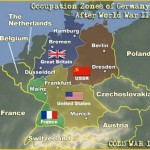 Postwar Occupation and Division of Germany - On May 8, 1945, the unconditional surrender of the German armed forces (Wehrmacht) was signed by Field Marshal Wilhelm Keitel in Berlin, ending World War II for Germany. The German people were suddenly confronted by a situation never before experienced in their history: the entire German territory was occupied by foreign armies, cities and infrastructure […]
Postwar Occupation and Division of Germany - On May 8, 1945, the unconditional surrender of the German armed forces (Wehrmacht) was signed by Field Marshal Wilhelm Keitel in Berlin, ending World War II for Germany. The German people were suddenly confronted by a situation never before experienced in their history: the entire German territory was occupied by foreign armies, cities and infrastructure […] Postwar Political Parties in Germany and Democratization - The reintroduction of democratic political parties in Germany was one of the primary concerns of the Allies during the final phase of the war. The Soviet authorities were the first to reestablish political parties in their zone. They ordered the formation of political parties on June 10, 1945, well before such a directive was issued […]
Postwar Political Parties in Germany and Democratization - The reintroduction of democratic political parties in Germany was one of the primary concerns of the Allies during the final phase of the war. The Soviet authorities were the first to reestablish political parties in their zone. They ordered the formation of political parties on June 10, 1945, well before such a directive was issued […]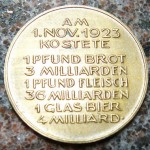 Problems of Parliamentary Politics in The Weimar Republic - The Weimar Republic was beset with serious problems from the outset that led many Germans either to withhold support from the new parliamentary democracy or to seek actively to destroy it. The extreme left and much of the right provided the republic’s most vitriolic opponents. Its supporters included the bulk of the left, represented by […]
Problems of Parliamentary Politics in The Weimar Republic - The Weimar Republic was beset with serious problems from the outset that led many Germans either to withhold support from the new parliamentary democracy or to seek actively to destroy it. The extreme left and much of the right provided the republic’s most vitriolic opponents. Its supporters included the bulk of the left, represented by […]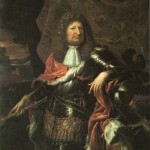 Prussia 2001 - On January 18, 1701 Friedrich III, Elector of Brandenburg (11.07.1657 – 25.02.1713), crowned himself as King in Prussia. Today, exactly 300 years after this outstanding event, the government heads of Berlin and Brandenburg, Mr. Diepgen and Mr. Stolpe, officially opened the celebrations on the occasion in the Berlin theater on Gendarmenmarkt. During 2001, more than […]
Prussia 2001 - On January 18, 1701 Friedrich III, Elector of Brandenburg (11.07.1657 – 25.02.1713), crowned himself as King in Prussia. Today, exactly 300 years after this outstanding event, the government heads of Berlin and Brandenburg, Mr. Diepgen and Mr. Stolpe, officially opened the celebrations on the occasion in the Berlin theater on Gendarmenmarkt. During 2001, more than […]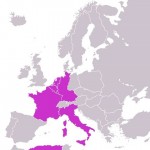 Rearmament and the European Defense Community - The outbreak of the Korean War in 1950 convinced Western leaders of the growing threat of international communism. The United States began to encourage the Europeans–the FRG in particular–to contribute to their own defense. For Germany, five years after having lost the most devastating of all wars, this meant forming an army, a step unthinkable […]
Rearmament and the European Defense Community - The outbreak of the Korean War in 1950 convinced Western leaders of the growing threat of international communism. The United States began to encourage the Europeans–the FRG in particular–to contribute to their own defense. For Germany, five years after having lost the most devastating of all wars, this meant forming an army, a step unthinkable […]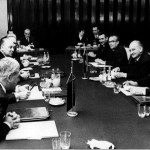 Relations Between the Two Germanys - Although Honecker pursued a tough policy against internal dissidents and carefully guarded the GDR’s unique identity as the state in which the old Marxist dream of socialism had become a reality, he was keenly aware of the necessity for communication and reasonable working relations with the FRG. His dream of being received at the White […]
Relations Between the Two Germanys - Although Honecker pursued a tough policy against internal dissidents and carefully guarded the GDR’s unique identity as the state in which the old Marxist dream of socialism had become a reality, he was keenly aware of the necessity for communication and reasonable working relations with the FRG. His dream of being received at the White […]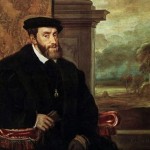 Resistance to Lutheranism in Germany - Although Lutheranism had powerful supporters, its survival was by no means certain. Its main opponent was the Habsburg emperor Charles V, who had inherited Spain, the Netherlands, southern Italy, Sicily, and the Austrian lands as patrimony and who hoped to restore the unity of the German Empire by keeping it Roman Catholic. Charles had been […]
Resistance to Lutheranism in Germany - Although Lutheranism had powerful supporters, its survival was by no means certain. Its main opponent was the Habsburg emperor Charles V, who had inherited Spain, the Netherlands, southern Italy, Sicily, and the Austrian lands as patrimony and who hoped to restore the unity of the German Empire by keeping it Roman Catholic. Charles had been […]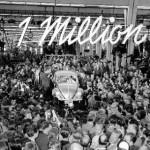 Social Market Economy in Germany - Germany’s economic growth during the first decades after the war at times overshadowed its marked success at joining the international community. In 1945 the country’s economy was shattered. A good part of what survived was later dismantled and carried off by the victorious Allies. Within Germany there was much argument about how to rebuild the […]
Social Market Economy in Germany - Germany’s economic growth during the first decades after the war at times overshadowed its marked success at joining the international community. In 1945 the country’s economy was shattered. A good part of what survived was later dismantled and carried off by the victorious Allies. Within Germany there was much argument about how to rebuild the […] Terrorism in Germany – Baader-Meinhof Gang - During the years of 1968-1977 Germany lived in fear. Three terrorist groups – the Red Army Faction (RAF), Movement 2 June, and the Revolutionary Cells (RZ) – gathered about a hundred Germans as their members. The Baader-Meinhof Gang, who called themselves the Red Army Faction, and two other terrorist groups went killing dozens of people. […]
Terrorism in Germany – Baader-Meinhof Gang - During the years of 1968-1977 Germany lived in fear. Three terrorist groups – the Red Army Faction (RAF), Movement 2 June, and the Revolutionary Cells (RZ) – gathered about a hundred Germans as their members. The Baader-Meinhof Gang, who called themselves the Red Army Faction, and two other terrorist groups went killing dozens of people. […]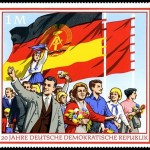 The “Socialist State of the German Nation” - The building of the Wall effectively halted large-scale emigration from the GDR. Although the SED failed to gain the active support of the majority of the population, young people, especially, began to tolerate the regime, at least passively. In the absence of any alternatives, they fulfilled their routine duties in youth organizations, schools, and workplaces. […]
The “Socialist State of the German Nation” - The building of the Wall effectively halted large-scale emigration from the GDR. Although the SED failed to gain the active support of the majority of the population, young people, especially, began to tolerate the regime, at least passively. In the absence of any alternatives, they fulfilled their routine duties in youth organizations, schools, and workplaces. […]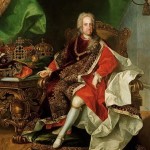 The Age of Enlightened Absolutism, 1648-1789 - Although the Holy Roman Empire no longer had a significant role in European politics after the Thirty Years’ War, it remained important in Germany, providing a framework for the many German states’ and cities’ conduct of their public affairs. The Reichstag, which remained in session at Regensburg from 1663 until the empire’s dissolution in 1806, […]
The Age of Enlightened Absolutism, 1648-1789 - Although the Holy Roman Empire no longer had a significant role in European politics after the Thirty Years’ War, it remained important in Germany, providing a framework for the many German states’ and cities’ conduct of their public affairs. The Reichstag, which remained in session at Regensburg from 1663 until the empire’s dissolution in 1806, […] The Amber Room Reconstruction - In the early 1980s, serious work on recreating the Amber Room based on old photographs and reminiscences was undertaken in the Catherine Palace, but the lack of funds threatened to put an end to the works. The process was left to the fate, but it seemed to be merciful to the Amber Room’s re-creators. Ruhrgas […]
The Amber Room Reconstruction - In the early 1980s, serious work on recreating the Amber Room based on old photographs and reminiscences was undertaken in the Catherine Palace, but the lack of funds threatened to put an end to the works. The process was left to the fate, but it seemed to be merciful to the Amber Room’s re-creators. Ruhrgas […]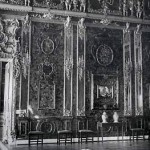 The Amber Room: History of the Creation - The history of the Amber Room dates back to the very beginning of the 18th century, when Andreas Schluter, the chief architect of the Prussian royal court, had the idea of using amber, a material never before used for interior decoration, to complete one of the rooms of the Great Royal Palace in Berlin during […]
The Amber Room: History of the Creation - The history of the Amber Room dates back to the very beginning of the 18th century, when Andreas Schluter, the chief architect of the Prussian royal court, had the idea of using amber, a material never before used for interior decoration, to complete one of the rooms of the Great Royal Palace in Berlin during […] The Berlin Wall - Besides its increasing economic difficulties, by the end of the 1950s the GDR encountered another problem that began to threaten its existence: large numbers of people were leaving East Germany for the West. Nearly half of those who fled the GDR were under twenty-five years of age. Although crossing the border between the two German […]
The Berlin Wall - Besides its increasing economic difficulties, by the end of the 1950s the GDR encountered another problem that began to threaten its existence: large numbers of people were leaving East Germany for the West. Nearly half of those who fled the GDR were under twenty-five years of age. Although crossing the border between the two German […]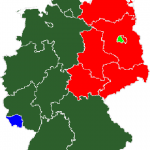 The Birth of the Federal Republic of Germany - Participants at the Potsdam Conference had agreed that the foreign ministers of the four victorious powers should meet to implement and monitor the conference’s decisions about postwar Europe. During their fifth meeting, held in London in late 1947, prospects for concluding a peace treaty with Germany were examined. Following lengthy discussions on the question of […]
The Birth of the Federal Republic of Germany - Participants at the Potsdam Conference had agreed that the foreign ministers of the four victorious powers should meet to implement and monitor the conference’s decisions about postwar Europe. During their fifth meeting, held in London in late 1947, prospects for concluding a peace treaty with Germany were examined. Following lengthy discussions on the question of […]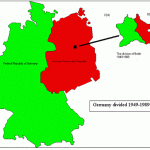 The Birth of the German Democratic Republic - As with the birth of the FRG, the formation of a separate nation-state in the Soviet zone also took only a few years. In late 1947, the SED convened the “German People’s Congress for Unity and a Just Peace” in Berlin. To demonstrate the SED’s claim of responsibility for the political future of all Germans, […]
The Birth of the German Democratic Republic - As with the birth of the FRG, the formation of a separate nation-state in the Soviet zone also took only a few years. In late 1947, the SED convened the “German People’s Congress for Unity and a Just Peace” in Berlin. To demonstrate the SED’s claim of responsibility for the political future of all Germans, […]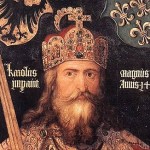 The Carolingian Dynasty, 752-911 – Medieval Germany - Charlemagne inherited the Frankish crown in 768. During his reign (768-814), he subdued Bavaria, conquered Lombardy and Saxony, and established his authority in central Italy. By the end of the eighth century, his kingdom, later to become known as the First Reich (empire in German), included present-day France, the Netherlands, Belgium, and Luxembourg, as well […]
The Carolingian Dynasty, 752-911 – Medieval Germany - Charlemagne inherited the Frankish crown in 768. During his reign (768-814), he subdued Bavaria, conquered Lombardy and Saxony, and established his authority in central Italy. By the end of the eighth century, his kingdom, later to become known as the First Reich (empire in German), included present-day France, the Netherlands, Belgium, and Luxembourg, as well […]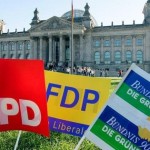 The Christian Democratic/Christian Socialist-Free Democratic Coalition, 1983- - The SPD-FDP coalition formed in 1969 became increasingly strained in the early 1980s, leading to concerns among the FDP leadership about its stability. The SPD had become deeply divided because many of its members found Chancellor Schmidt’s policies too conservative. Particularly troublesome was his position on NATO’s Dual-Track Decision, which required the stationing of new […]
The Christian Democratic/Christian Socialist-Free Democratic Coalition, 1983- - The SPD-FDP coalition formed in 1969 became increasingly strained in the early 1980s, leading to concerns among the FDP leadership about its stability. The SPD had become deeply divided because many of its members found Chancellor Schmidt’s policies too conservative. Particularly troublesome was his position on NATO’s Dual-Track Decision, which required the stationing of new […]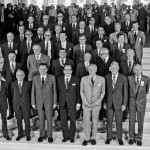 The Conference on Security and Cooperation in Europe - Keen to gain international recognition of its sphere of interest and believing that such recognition would solidify its grip on its East European satellite states, the Soviet Union, beginning in the early 1970s, sponsored an initiative calling for the convening of a Conference on Security and Cooperation in Europe (CSCE). For the West, such meetings […]
The Conference on Security and Cooperation in Europe - Keen to gain international recognition of its sphere of interest and believing that such recognition would solidify its grip on its East European satellite states, the Soviet Union, beginning in the early 1970s, sponsored an initiative calling for the convening of a Conference on Security and Cooperation in Europe (CSCE). For the West, such meetings […]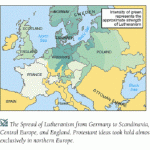 The Counter-Reformation and Religious Tensions - The Peace of Augsburg brought peace but did not settle the religious disagreements in Germany. For one thing, its signatories did not recognize Calvinism, a relatively stringent form of Protestantism that was gaining prominence around the time the Augsburg treaty was signed, in what has been called the Second Reformation. Adherents to both Calvinism and […]
The Counter-Reformation and Religious Tensions - The Peace of Augsburg brought peace but did not settle the religious disagreements in Germany. For one thing, its signatories did not recognize Calvinism, a relatively stringent form of Protestantism that was gaining prominence around the time the Augsburg treaty was signed, in what has been called the Second Reformation. Adherents to both Calvinism and […]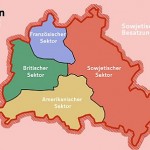 The Creation of the Bizone - By early 1946, the Western Allies–the United States and Britain in particular–had become convinced that Soviet expansionism had to be contained. The Soviet Union’s seizure of Polish territory and the drawing of the Oder-Neisse border (which gave formerly German territory to Poland), its antidemocratic actions in other countries occupied by Soviet forces, and its policies […]
The Creation of the Bizone - By early 1946, the Western Allies–the United States and Britain in particular–had become convinced that Soviet expansionism had to be contained. The Soviet Union’s seizure of Polish territory and the drawing of the Oder-Neisse border (which gave formerly German territory to Poland), its antidemocratic actions in other countries occupied by Soviet forces, and its policies […]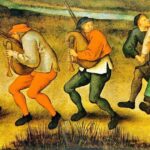 The Dark Side of German History: Strange and Unusual Events - Germany’s history is full of invention, philosophy, and cultural brilliance—but beneath that polished surface lies a strange and eerie past. From bizarre medieval justice systems to mysterious disappearances and unexplained phenomena, Germany has seen its share of bizarre and unsettling events. While most history books focus on wars and political movements, there are stories lurking […]
The Dark Side of German History: Strange and Unusual Events - Germany’s history is full of invention, philosophy, and cultural brilliance—but beneath that polished surface lies a strange and eerie past. From bizarre medieval justice systems to mysterious disappearances and unexplained phenomena, Germany has seen its share of bizarre and unsettling events. While most history books focus on wars and political movements, there are stories lurking […]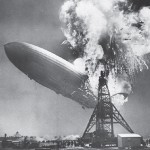 The Death of the Hindenburg - Hindenburg was a masterpiece of zeppelin design. Equipped with four 1200 hp Mercedes Benz engines, having 245 m in length, about 41 m in diameter and almost 212000 cubic meters of gas volume, she still holds the record of the largest airship ever built and flying. She can be truly called the Titanic of the […]
The Death of the Hindenburg - Hindenburg was a masterpiece of zeppelin design. Equipped with four 1200 hp Mercedes Benz engines, having 245 m in length, about 41 m in diameter and almost 212000 cubic meters of gas volume, she still holds the record of the largest airship ever built and flying. She can be truly called the Titanic of the […]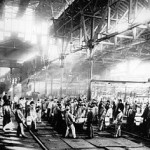 The Economy and Population Growth in Germany - Germany experienced an economic boom immediately after unification. For the first time, the country was a single economic entity, and old impediments to internal trade were lifted. The federal chancellery published a new commercial code and established a uniform currency. The indemnity that France had to pay Germany after losing the 1870-71 war provided capital […]
The Economy and Population Growth in Germany - Germany experienced an economic boom immediately after unification. For the first time, the country was a single economic entity, and old impediments to internal trade were lifted. The federal chancellery published a new commercial code and established a uniform currency. The indemnity that France had to pay Germany after losing the 1870-71 war provided capital […]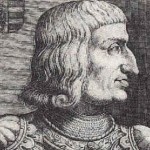 The Empire Under the Early Habsburgs – Medieval Germany - The Great Interregnum ended in 1273 with the election of Rudolf of Habsburg as king-emperor. After the interregnum period, Germany’s emperors came from three powerful dynastic houses: Luxemburg (in Bohemia), Wittelsbach (in Bavaria), and Habsburg (in Austria). These families alternated on the imperial throne until the crown returned in the mid-fifteenth century to the Habsburgs, […]
The Empire Under the Early Habsburgs – Medieval Germany - The Great Interregnum ended in 1273 with the election of Rudolf of Habsburg as king-emperor. After the interregnum period, Germany’s emperors came from three powerful dynastic houses: Luxemburg (in Bohemia), Wittelsbach (in Bavaria), and Habsburg (in Austria). These families alternated on the imperial throne until the crown returned in the mid-fifteenth century to the Habsburgs, […] The Fall of the Wall and Reunification - In the middle of the 1980s the Cold War started to melt, especially due to the changes in the Soviet government. Mikhail Gorbachev, the first and the only President of the USSR, started a new political wave called Perestroika, and made a friendly step towards the West acknowledging the dependence of the Soviet Union on […]
The Fall of the Wall and Reunification - In the middle of the 1980s the Cold War started to melt, especially due to the changes in the Soviet government. Mikhail Gorbachev, the first and the only President of the USSR, started a new political wave called Perestroika, and made a friendly step towards the West acknowledging the dependence of the Soviet Union on […]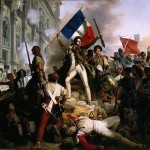 The French Revolution and Germany - The French Revolution, which erupted in 1789 with the storming of the Bastille in Paris, at first gained the enthusiastic approval of some German intellectuals, who welcomed the proclamation of a constitution and a bill of rights. Within a few years, most of this support had dissipated, replaced by fear of a newly aggressive French […]
The French Revolution and Germany - The French Revolution, which erupted in 1789 with the storming of the Bastille in Paris, at first gained the enthusiastic approval of some German intellectuals, who welcomed the proclamation of a constitution and a bill of rights. Within a few years, most of this support had dissipated, replaced by fear of a newly aggressive French […]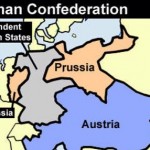 The German Confederation, 1815-66 - The Congress of Vienna (1814-15), convened after Napoleon’s defeat, sought to restore order in Europe disrupted by revolutionary and imperial France. Its members’ objective was a constellation of states and a balance of power that would ensure peace and stability after a quarter-century of revolution and war. In addition to the delegates of many small […]
The German Confederation, 1815-66 - The Congress of Vienna (1814-15), convened after Napoleon’s defeat, sought to restore order in Europe disrupted by revolutionary and imperial France. Its members’ objective was a constellation of states and a balance of power that would ensure peace and stability after a quarter-century of revolution and war. In addition to the delegates of many small […] The German Witch Hunts: A Dark Chapter in European History - Imagine a time when a suspicious glance or a failed harvest could land you on trial for witchcraft—complete with pitchfork-wielding neighbors and a one-way ticket to the stake. Welcome to The German Witch Hunts: A Dark Chapter of European History. Between the 15th and 18th centuries, Germany became the epicenter of a witch-hunting frenzy that […]
The German Witch Hunts: A Dark Chapter in European History - Imagine a time when a suspicious glance or a failed harvest could land you on trial for witchcraft—complete with pitchfork-wielding neighbors and a one-way ticket to the stake. Welcome to The German Witch Hunts: A Dark Chapter of European History. Between the 15th and 18th centuries, Germany became the epicenter of a witch-hunting frenzy that […]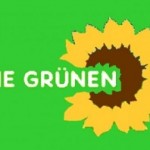 The Greens in Germany - In the aftermath of the oil crisis of 1973, regional political groups concerned with environmental issues began to put up candidates in communal and regional elections. In 1980 a number of ecological groups, alternative action movements, and various women’s rights organizations banded together on the national level to form the political party that came to […]
The Greens in Germany - In the aftermath of the oil crisis of 1973, regional political groups concerned with environmental issues began to put up candidates in communal and regional elections. In 1980 a number of ecological groups, alternative action movements, and various women’s rights organizations banded together on the national level to form the political party that came to […]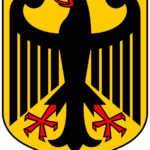 The History and Meaning of German Coat of Arms and National Symbols - Germany’s national symbols and coat of arms carry deep historical significance, reflecting centuries of political, cultural, and social evolution. From the majestic Black Eagle to the striking colors of the German flag, these symbols have undergone transformations while maintaining their national identity. In this article, we will explore the history and meaning of the German […]
The History and Meaning of German Coat of Arms and National Symbols - Germany’s national symbols and coat of arms carry deep historical significance, reflecting centuries of political, cultural, and social evolution. From the majestic Black Eagle to the striking colors of the German flag, these symbols have undergone transformations while maintaining their national identity. In this article, we will explore the history and meaning of the German […]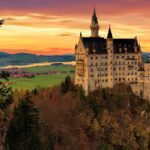 The History of German Castles: From Medieval Fortresses to Fairytale Palaces - Germany is home to some of the most breathtaking castles in the world, each one steeped in history, myth, and grandeur. From the imposing medieval fortresses that once housed knights and lords to the whimsical, dreamlike palaces that inspired fairy tales, German castles are a testament to the country’s rich and complex past. These architectural […]
The History of German Castles: From Medieval Fortresses to Fairytale Palaces - Germany is home to some of the most breathtaking castles in the world, each one steeped in history, myth, and grandeur. From the imposing medieval fortresses that once housed knights and lords to the whimsical, dreamlike palaces that inspired fairy tales, German castles are a testament to the country’s rich and complex past. These architectural […] The History of the Autobahn: From Bismarck to the Bundesautobahn - The Autobahn is not just a network of highways but a historical artifact that reflects Germany’s past from the industrial age to modern times. This article traces the evolution of the Autobahn, debunking common myths about its origins and highlighting key historical milestones that contributed to its current status as an icon of automotive freedom […]
The History of the Autobahn: From Bismarck to the Bundesautobahn - The Autobahn is not just a network of highways but a historical artifact that reflects Germany’s past from the industrial age to modern times. This article traces the evolution of the Autobahn, debunking common myths about its origins and highlighting key historical milestones that contributed to its current status as an icon of automotive freedom […]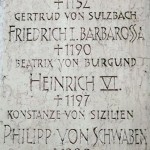 The Hohenstaufen Dynasty, 1138-1254 – Medieval Germany - Following the death of Henry V (r. 1106-25), the last of the Salian kings, the dukes refused to elect his nephew because they feared that he might restore royal power. Instead, they elected a noble connected to the Saxon noble family Welf (often written as Guelf). This choice inflamed the Hohenstaufen family of Swabia, which […]
The Hohenstaufen Dynasty, 1138-1254 – Medieval Germany - Following the death of Henry V (r. 1106-25), the last of the Salian kings, the dukes refused to elect his nephew because they feared that he might restore royal power. Instead, they elected a noble connected to the Saxon noble family Welf (often written as Guelf). This choice inflamed the Hohenstaufen family of Swabia, which […] The Holy Roman Empire: An Epoch of European History - The Holy Roman Empire, often deemed a paradoxical entity, was a multi-ethnic complex of territories in Western, Central and Southern Europe that developed during the Early Middle Ages and continued until its dissolution in 1806 during the Napoleonic Wars. Despite the anachronistic association with Rome, the Empire was a distinctly European polity that emerged in […]
The Holy Roman Empire: An Epoch of European History - The Holy Roman Empire, often deemed a paradoxical entity, was a multi-ethnic complex of territories in Western, Central and Southern Europe that developed during the Early Middle Ages and continued until its dissolution in 1806 during the Napoleonic Wars. Despite the anachronistic association with Rome, the Empire was a distinctly European polity that emerged in […]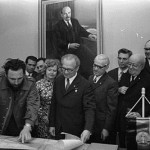 The Honecker Era, 1971-1989 - Ulbricht’s successor in East Germany was Erich Honecker. Born in 1913 in Saarland, Honecker joined the Communist Party of Germany (Kommunistische Partei Deutschlands–KPD) in 1929. As a full-time functionary of the party, he continued his work in the underground movement after Hitler came to power in 1933 and until arrested by the Nazis in 1935. […]
The Honecker Era, 1971-1989 - Ulbricht’s successor in East Germany was Erich Honecker. Born in 1913 in Saarland, Honecker joined the Communist Party of Germany (Kommunistische Partei Deutschlands–KPD) in 1929. As a full-time functionary of the party, he continued his work in the underground movement after Hitler came to power in 1933 and until arrested by the Nazis in 1935. […]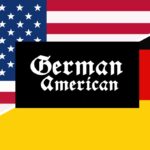 The Influence of German Culture on American Traditions - German culture has left an indelible mark on the United States, shaping everything from food and festivals to language and education. With over 40 million Americans claiming German ancestry, it is no surprise that many aspects of American life have been influenced by German traditions. Whether it is the beloved holiday customs, iconic food staples, […]
The Influence of German Culture on American Traditions - German culture has left an indelible mark on the United States, shaping everything from food and festivals to language and education. With over 40 million Americans claiming German ancestry, it is no surprise that many aspects of American life have been influenced by German traditions. Whether it is the beloved holiday customs, iconic food staples, […]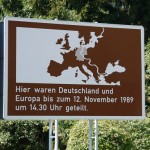 The Last Days of East Germany - In January 1988, Honecker paid a state visit to France. By all indications, the long stretch of international isolation appeared to have been successfully overcome. The GDR finally seemed to be taking its long-sought place among the international community of nations. In the minds of the GDR’s old-guard communists, the long-awaited international political recognition was […]
The Last Days of East Germany - In January 1988, Honecker paid a state visit to France. By all indications, the long stretch of international isolation appeared to have been successfully overcome. The GDR finally seemed to be taking its long-sought place among the international community of nations. In the minds of the GDR’s old-guard communists, the long-awaited international political recognition was […]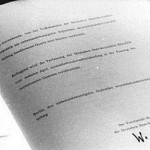 The New East German Constitution and the Question of Identity - Although the GDR had finally achieved its goal of international recognition with the signing of the Basic Treaty in December 1972, renewed concerns about the stability and identity of the GDR as a second German state drove the SED Politburo toward a policy of reaffirming the socialist nature of the state. As early as 1971, […]
The New East German Constitution and the Question of Identity - Although the GDR had finally achieved its goal of international recognition with the signing of the Basic Treaty in December 1972, renewed concerns about the stability and identity of the GDR as a second German state drove the SED Politburo toward a policy of reaffirming the socialist nature of the state. As early as 1971, […]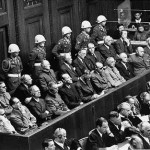 The Nuremberg Trials and Denazification - The Allies agreed that Germany should never again have the opportunity to destroy European peace as it had in the two world wars. A principal aim of the Allies was to prevent the resurgence of a powerful and aggressive Germany. As a first step toward demilitarizing, denazifying, and democratizing Germany, the Allies established an international […]
The Nuremberg Trials and Denazification - The Allies agreed that Germany should never again have the opportunity to destroy European peace as it had in the two world wars. A principal aim of the Allies was to prevent the resurgence of a powerful and aggressive Germany. As a first step toward demilitarizing, denazifying, and democratizing Germany, the Allies established an international […]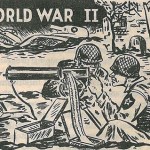 The Outbreak of World War II - On September 1, 1939, German troops invaded Poland. Britain and France declared war on Germany two days later. By the end of the month, Hitler’s armies had overrun western Poland. Soviet armies occupied eastern Poland, and the two countries subsequently formally divided Poland between them. In April 1940, German forces conquered Denmark and Norway, and […]
The Outbreak of World War II - On September 1, 1939, German troops invaded Poland. Britain and France declared war on Germany two days later. By the end of the month, Hitler’s armies had overrun western Poland. Soviet armies occupied eastern Poland, and the two countries subsequently formally divided Poland between them. In April 1940, German forces conquered Denmark and Norway, and […]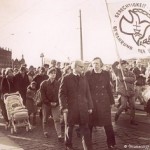 The Peace Movement and Internal Resistance in GDR - The GDR leadership welcomed protests against weapons and war as long as they occurred in the FRG. However, when a small group of East German pacifists advocating the conversion of “swords into plowshares” demonstrated in 1981 against the presence of Soviet missiles on GDR soil, as well as against the destruction of the environment by […]
The Peace Movement and Internal Resistance in GDR - The GDR leadership welcomed protests against weapons and war as long as they occurred in the FRG. However, when a small group of East German pacifists advocating the conversion of “swords into plowshares” demonstrated in 1981 against the presence of Soviet missiles on GDR soil, as well as against the destruction of the environment by […]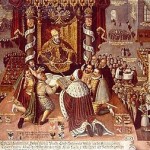 The Peace of Augsburg - Imagine a country where the ruler’s religion dictated your own. No choice. No freedom of belief. Just the heavy hand of authority deciding how – and to whom – you should pray. Welcome to 16th-century Germany, a land torn by one of Europe’s fiercest struggles: the battle between Catholicism and Protestantism. And at the heart […]
The Peace of Augsburg - Imagine a country where the ruler’s religion dictated your own. No choice. No freedom of belief. Just the heavy hand of authority deciding how – and to whom – you should pray. Welcome to 16th-century Germany, a land torn by one of Europe’s fiercest struggles: the battle between Catholicism and Protestantism. And at the heart […] The Peace of Westphalia - The Peace of Westphalia largely settled German affairs for the next century and a half. It ended religious conflicts between the states and included official recognition of Calvinism. Its signatories altered the boundaries of the empire by recognizing that Switzerland and the Netherlands had become sovereign states outside the empire. Portions of Alsace and Lorraine […]
The Peace of Westphalia - The Peace of Westphalia largely settled German affairs for the next century and a half. It ended religious conflicts between the states and included official recognition of Calvinism. Its signatories altered the boundaries of the empire by recognizing that Switzerland and the Netherlands had become sovereign states outside the empire. Portions of Alsace and Lorraine […]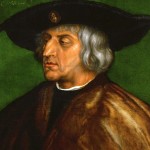 The Protestant Reformation - On the eve of the Protestant Reformation, the institutions of the Holy Roman Empire were widely thought to be in need of improvement. The Habsburg emperors Frederick III (r. 1440-93) and his son Maximilian I (r. 1493-1519) both cooperated with individual local rulers to enact changes. However, the imperial and local parties had different aims, […]
The Protestant Reformation - On the eve of the Protestant Reformation, the institutions of the Holy Roman Empire were widely thought to be in need of improvement. The Habsburg emperors Frederick III (r. 1440-93) and his son Maximilian I (r. 1493-1519) both cooperated with individual local rulers to enact changes. However, the imperial and local parties had different aims, […]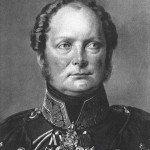 The Restoration of Germany - Within just a few months, liberal hopes for a reformed Germany were disappointed. Conservative forces saw that the liberal movement was divided into a number of camps having sharply different aims. Furthermore, the liberals had little support left among the lower classes, who had supported them in the first weeks of the revolution by constructing […]
The Restoration of Germany - Within just a few months, liberal hopes for a reformed Germany were disappointed. Conservative forces saw that the liberal movement was divided into a number of camps having sharply different aims. Furthermore, the liberals had little support left among the lower classes, who had supported them in the first weeks of the revolution by constructing […] The Resurgence and Influence of New German Cinema: A Cultural Renaissance - In the midst of the 20th century, a cinematic movement emerged from West Germany, marking a pivotal moment in film history. This movement, known as New German Cinema (Neuer Deutscher Film), redefined the landscape of German filmmaking, introducing groundbreaking directors, innovative storytelling, and profound thematic explorations that resonated globally. This article delves into the origins, […]
The Resurgence and Influence of New German Cinema: A Cultural Renaissance - In the midst of the 20th century, a cinematic movement emerged from West Germany, marking a pivotal moment in film history. This movement, known as New German Cinema (Neuer Deutscher Film), redefined the landscape of German filmmaking, introducing groundbreaking directors, innovative storytelling, and profound thematic explorations that resonated globally. This article delves into the origins, […]- The Reunification of Germany and Its Aftermath - The East German and West German economies at the time of unification looked very similar. They both concentrated on industrial production, especially machine tools, chemicals, automobiles, and precision manufactures. Both had a well-trained labor force and an important export component, although their exports went largely in opposite directions. But the East German economy was highly […]
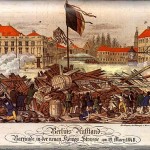 The Revolutions of 1848 - Europe endured hard times during much of the 1840s. A series of bad harvests culminating in the potato blight of 1845-46 brought widespread misery and some starvation. An economic depression added to the hardship, spreading discontent among the poor and the middle class alike. A popular uprising in Paris in February 1848 turned into a […]
The Revolutions of 1848 - Europe endured hard times during much of the 1840s. A series of bad harvests culminating in the potato blight of 1845-46 brought widespread misery and some starvation. An economic depression added to the hardship, spreading discontent among the poor and the middle class alike. A popular uprising in Paris in February 1848 turned into a […] The Rise of Monastic Winemaking in Germany: German Medieval Wine Culture - Germany, renowned for its rich winemaking traditions, has a fascinating history deeply intertwined with the monastic communities that flourished during the Middle Ages. This period witnessed the rise of monastic winemaking, contributing to the development of German medieval wine culture. In this article, we delve into the captivating story of how monastic orders played a […]
The Rise of Monastic Winemaking in Germany: German Medieval Wine Culture - Germany, renowned for its rich winemaking traditions, has a fascinating history deeply intertwined with the monastic communities that flourished during the Middle Ages. This period witnessed the rise of monastic winemaking, contributing to the development of German medieval wine culture. In this article, we delve into the captivating story of how monastic orders played a […]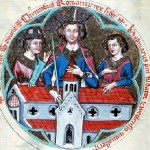 The Salian Dynasty, 1024-1125 – Medieval Germany - After the death of the last Saxon king in 1024, the crown passed to the Salians, a Frankish tribe. The four Salian kings–Conrad II, Henry III, Henry IV, and Henry V–who ruled Germany as kings from 1024 to 1125, established their monarchy as a major European power. Their main accomplishment was the development of a […]
The Salian Dynasty, 1024-1125 – Medieval Germany - After the death of the last Saxon king in 1024, the crown passed to the Salians, a Frankish tribe. The four Salian kings–Conrad II, Henry III, Henry IV, and Henry V–who ruled Germany as kings from 1024 to 1125, established their monarchy as a major European power. Their main accomplishment was the development of a […]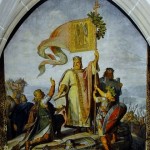 The Saxon Dynasty, 919-1024 – Medieval Germany - Because the dukes of the East Frankish Kingdom had wearied of being ruled by a foreign king, they elected a German to serve as their king once the Carolingian line expired. The election of Conrad I (r. 911-18), Duke of Franconia, as the first German king has been marked by some historians as the beginning […]
The Saxon Dynasty, 919-1024 – Medieval Germany - Because the dukes of the East Frankish Kingdom had wearied of being ruled by a foreign king, they elected a German to serve as their king once the Carolingian line expired. The election of Conrad I (r. 911-18), Duke of Franconia, as the first German king has been marked by some historians as the beginning […]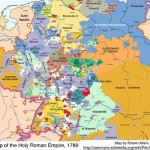 The Smaller States of Germany: German History - By the eighteenth century, none of the other states of the German empire were strong enough to have territorial ambitions to match those of Prussia and Austria. Some of the larger states, such as Saxony, Bavaria, and Wuerttemberg, also maintained standing armies, but their smaller size compelled them to seek allies, some from outside the […]
The Smaller States of Germany: German History - By the eighteenth century, none of the other states of the German empire were strong enough to have territorial ambitions to match those of Prussia and Austria. Some of the larger states, such as Saxony, Bavaria, and Wuerttemberg, also maintained standing armies, but their smaller size compelled them to seek allies, some from outside the […] The Social Democratic-Free Democratic Coalition, 1969-82 and Willy Brandt - In the West German Bundestag elections of September 1969, the CDU/CSU remained the largest political group, holding eighteen more seats than the SPD. With the help of the FDP, which had earlier supported the candidacy of the SPD minister of justice Gustav Heinemann for the federal presidency, Willy Brandt was able to form an SPD-FDP […]
The Social Democratic-Free Democratic Coalition, 1969-82 and Willy Brandt - In the West German Bundestag elections of September 1969, the CDU/CSU remained the largest political group, holding eighteen more seats than the SPD. With the help of the FDP, which had earlier supported the candidacy of the SPD minister of justice Gustav Heinemann for the federal presidency, Willy Brandt was able to form an SPD-FDP […]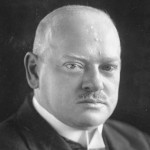 The Stresemann Era in Weimar Republic - Gustav Stresemann, a German politician and statesman who served as Chancellor in 1923 (for a brief period of 102 days) and Foreign Minister 1923–1929, during the Weimar Republic. He was co-laureate of the Nobel Peace Prize in 1926. Stresemann was a Vernunftrepublikaner, that is, someone who supported the Weimar Republic because it seemed the best […]
The Stresemann Era in Weimar Republic - Gustav Stresemann, a German politician and statesman who served as Chancellor in 1923 (for a brief period of 102 days) and Foreign Minister 1923–1929, during the Weimar Republic. He was co-laureate of the Nobel Peace Prize in 1926. Stresemann was a Vernunftrepublikaner, that is, someone who supported the Weimar Republic because it seemed the best […]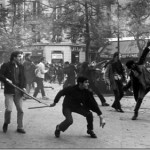 The Student Movement and Terrorism in Germany - In addition to troubling economic and environmental problems for which no easy solutions were available, West Germany and its politicians had to contend with two new sources of social unrest: the student movement of the late 1960s and early 1970s, and left-wing terrorism, which originated in the late 1960s, but which had its greatest impact […]
The Student Movement and Terrorism in Germany - In addition to troubling economic and environmental problems for which no easy solutions were available, West Germany and its politicians had to contend with two new sources of social unrest: the student movement of the late 1960s and early 1970s, and left-wing terrorism, which originated in the late 1960s, but which had its greatest impact […]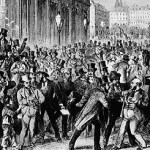 The Tariff Agreement of 1879 in Germany and Its Social Consequences - Germany experienced an economic boom immediately after unification. For the first time, the country was a single economic entity, and old impediments to internal trade were lifted. The federal chancellery published a new commercial code and established a uniform currency. The indemnity that France had to pay Germany after losing the 1870-71 war provided capital […]
The Tariff Agreement of 1879 in Germany and Its Social Consequences - Germany experienced an economic boom immediately after unification. For the first time, the country was a single economic entity, and old impediments to internal trade were lifted. The federal chancellery published a new commercial code and established a uniform currency. The indemnity that France had to pay Germany after losing the 1870-71 war provided capital […] The Third Reich: Consolidation of Power - Hitler rapidly transformed the Weimar Republic into a dictatorship. The National Socialists accomplished their “revolution” within months, using a combination of legal procedure, persuasion, and terror. Because the parties forming the cabinet did not have a parliamentary majority, Hindenburg called for the dissolution of the Reichstag and set March 5, 1933, as the date for […]
The Third Reich: Consolidation of Power - Hitler rapidly transformed the Weimar Republic into a dictatorship. The National Socialists accomplished their “revolution” within months, using a combination of legal procedure, persuasion, and terror. Because the parties forming the cabinet did not have a parliamentary majority, Hindenburg called for the dissolution of the Reichstag and set March 5, 1933, as the date for […]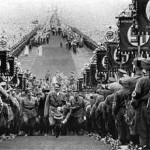 The Third Reich: Foreign Policy - Once his regime was consolidated, Hitler took little interest in domestic policy, his sole concern being that Germany become sufficiently strong to realize his long-term geopolitical goal of creating a German empire that would dominate western Europe and extend deep into Russia. In a first step toward this goal, he made a de facto revision […]
The Third Reich: Foreign Policy - Once his regime was consolidated, Hitler took little interest in domestic policy, his sole concern being that Germany become sufficiently strong to realize his long-term geopolitical goal of creating a German empire that would dominate western Europe and extend deep into Russia. In a first step toward this goal, he made a de facto revision […]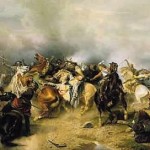 The Thirty Years’ War - Germany enjoyed a time of relative quiet between the Peace of Augsburg, signed in 1555, and the outbreak of the Thirty Years’ War in 1618. The empire functioned in a more regular way than previously, and its federal nature was more evident than in the past. The Reichstag met frequently to deal with public matters, […]
The Thirty Years’ War - Germany enjoyed a time of relative quiet between the Peace of Augsburg, signed in 1555, and the outbreak of the Thirty Years’ War in 1618. The empire functioned in a more regular way than previously, and its federal nature was more evident than in the past. The Reichstag met frequently to deal with public matters, […]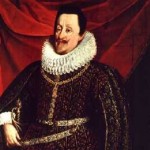 The Thirty Years’ War – Military Campaigns - The Thirty Years’ War resulted from a local rebellion, but the admixture of religion transformed it into a European conflict that lasted for more than a generation and devastated Germany. In 1618 Bohemian nobles opposed the decision of Emperor Matthias (r. 1608-19) to designate his Catholic cousin Ferdinand king of Bohemia. Instead, the nobles elected […]
The Thirty Years’ War – Military Campaigns - The Thirty Years’ War resulted from a local rebellion, but the admixture of religion transformed it into a European conflict that lasted for more than a generation and devastated Germany. In 1618 Bohemian nobles opposed the decision of Emperor Matthias (r. 1608-19) to designate his Catholic cousin Ferdinand king of Bohemia. Instead, the nobles elected […]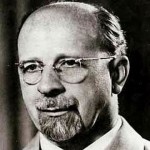 The Ulbricht Era, 1949-71 - Soviet dictator Stalin died in March 1953. In large portions of the East German population, particularly among workers suffering under the high production quotas set by the SED, Stalin’s death gave rise to hopes for an improvement in living conditions and for an easing of political terror. In an attempt to stave off increasing unrest […]
The Ulbricht Era, 1949-71 - Soviet dictator Stalin died in March 1953. In large portions of the East German population, particularly among workers suffering under the high production quotas set by the SED, Stalin’s death gave rise to hopes for an improvement in living conditions and for an easing of political terror. In an attempt to stave off increasing unrest […] The Underground Cities of Germany: Bunkers, Tunnels, and Hidden Secrets - Beneath the charming cobblestone streets of Germany lies a hidden world—one of underground bunkers, secret tunnels, and forgotten subterranean cities. While tourists flock to iconic landmarks like Neuschwanstein Castle or Brandenburg Gate, few realize that an entire network of history runs beneath their feet. From wartime bunkers to medieval escape tunnels, Germany’s underground is a […]
The Underground Cities of Germany: Bunkers, Tunnels, and Hidden Secrets - Beneath the charming cobblestone streets of Germany lies a hidden world—one of underground bunkers, secret tunnels, and forgotten subterranean cities. While tourists flock to iconic landmarks like Neuschwanstein Castle or Brandenburg Gate, few realize that an entire network of history runs beneath their feet. From wartime bunkers to medieval escape tunnels, Germany’s underground is a […] The Warsaw Pact and the National People’s Army - The Soviet Union and seven of its European satellites sign a treaty establishing the Warsaw Pact, a mutual defense organization that put the Soviets in command of the armed forces of the member states. The Warsaw Pact, so named because the treaty was signed in Warsaw, included the Soviet Union, Albania, Poland, Romania, Hungary, East […]
The Warsaw Pact and the National People’s Army - The Soviet Union and seven of its European satellites sign a treaty establishing the Warsaw Pact, a mutual defense organization that put the Soviets in command of the armed forces of the member states. The Warsaw Pact, so named because the treaty was signed in Warsaw, included the Soviet Union, Albania, Poland, Romania, Hungary, East […]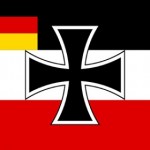 The Weimar Republic, 1918-33 - The Weimar Republic, proclaimed on November 9, 1918, was born in the throes of military defeat and social revolution. In January 1919, a National Assembly was elected to draft a constitution. The government, composed of members from the assembly, came to be called the Weimar coalition and included the SPD; the German Democratic Party (Deutsche […]
The Weimar Republic, 1918-33 - The Weimar Republic, proclaimed on November 9, 1918, was born in the throes of military defeat and social revolution. In January 1919, a National Assembly was elected to draft a constitution. The government, composed of members from the assembly, came to be called the Weimar coalition and included the SPD; the German Democratic Party (Deutsche […]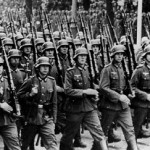 Total Mobilization, Resistance, and the Holocaust in Germany - Once it became clear that the war would not be a short one, Germany’s industry was reorganized for a total mobilization. Between February 1942 and July 1944, armaments production increased threefold despite intense Allied bombing raids. Much of the labor for this increase came from the employment of some 7 million foreigners, taken from their […]
Total Mobilization, Resistance, and the Holocaust in Germany - Once it became clear that the war would not be a short one, Germany’s industry was reorganized for a total mobilization. Between February 1942 and July 1944, armaments production increased threefold despite intense Allied bombing raids. Much of the labor for this increase came from the employment of some 7 million foreigners, taken from their […] Tracing Your German Ancestry: A Comprehensive Guide - Discovering your family roots can be a fascinating journey, especially for those with German ancestry. Germany has a rich history and culture, but tracing German ancestors can sometimes be a complex process due to the nation’s tumultuous history and the fragmentation of the region into various principalities and states before its unification in 1871. This […]
Tracing Your German Ancestry: A Comprehensive Guide - Discovering your family roots can be a fascinating journey, especially for those with German ancestry. Germany has a rich history and culture, but tracing German ancestors can sometimes be a complex process due to the nation’s tumultuous history and the fragmentation of the region into various principalities and states before its unification in 1871. This […]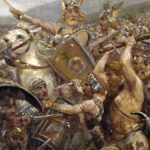 Unraveling the Mystery: The Battle of the Teutoburg Forest - The Battle of the Teutoburg Forest, a pivotal event in ancient history, marked a significant turning point in the Roman Empire’s expansionist ambitions. In 9 AD, an alliance of Germanic tribes, led by Arminius, a chieftain of the Cherusci tribe, ambushed and decimated three Roman legions commanded by Publius Quinctilius Varus. This battle, fought in […]
Unraveling the Mystery: The Battle of the Teutoburg Forest - The Battle of the Teutoburg Forest, a pivotal event in ancient history, marked a significant turning point in the Roman Empire’s expansionist ambitions. In 9 AD, an alliance of Germanic tribes, led by Arminius, a chieftain of the Cherusci tribe, ambushed and decimated three Roman legions commanded by Publius Quinctilius Varus. This battle, fought in […]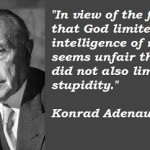 West Germany and the Community of Nations - At the end of World War II, Germany was a defeated nation occupied by foreign powers. It had lost its national sovereignty, and the world saw it as a pariah, guilty of crimes without parallel in history. In addition to rebuilding their shattered country in a physical sense, most leading German politicians saw their main […]
West Germany and the Community of Nations - At the end of World War II, Germany was a defeated nation occupied by foreign powers. It had lost its national sovereignty, and the world saw it as a pariah, guilty of crimes without parallel in history. In addition to rebuilding their shattered country in a physical sense, most leading German politicians saw their main […]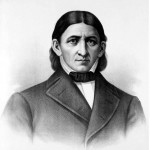 Who Invented Kindergarten? - For many people a kindergarten is associated with • a nursery school equipped with toys, building blocks, book puzzles, art supplies, and an outdoor playground; • day care attendance for the children of working parents; • an institution for early childhood development at the same time. Its aim is to bring up self-confident and social […]
Who Invented Kindergarten? - For many people a kindergarten is associated with • a nursery school equipped with toys, building blocks, book puzzles, art supplies, and an outdoor playground; • day care attendance for the children of working parents; • an institution for early childhood development at the same time. Its aim is to bring up self-confident and social […] Women in Nazi Germany - The Nazis had very firm ideas about the role of women in Germany. Hitler thought that the population of Germany had to increase for the country to become more powerful. Therefore women were forced to give up work and have children. On 5th July 1933 the Law for the Encouragement of Marriage was passed. This […]
Women in Nazi Germany - The Nazis had very firm ideas about the role of women in Germany. Hitler thought that the population of Germany had to increase for the country to become more powerful. Therefore women were forced to give up work and have children. On 5th July 1933 the Law for the Encouragement of Marriage was passed. This […]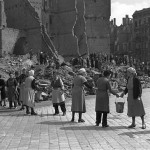 Women in Post-War Germany - Post-War life for German women was harsh. Trümmerfrau (literally translated as ruins woman or rubble woman) is the German-language name for women who, in the aftermath of World War II, helped clear and reconstruct the bombed cities of Germany and Austria. With hundreds of cities having suffered significant bombing and firestorm damage through aerial attacks […]
Women in Post-War Germany - Post-War life for German women was harsh. Trümmerfrau (literally translated as ruins woman or rubble woman) is the German-language name for women who, in the aftermath of World War II, helped clear and reconstruct the bombed cities of Germany and Austria. With hundreds of cities having suffered significant bombing and firestorm damage through aerial attacks […]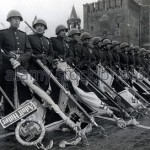 World War II – Defeat - In June 1944, American, British, and Canadian forces invaded France, driving the Germans back and liberating Paris by August. A German counteroffensive in the Ardennes began in late December was beaten back after heavy fighting in what became known as the Battle of the Bulge. Soviet troops, meanwhile, advanced from the east. Western forces reached […]
World War II – Defeat - In June 1944, American, British, and Canadian forces invaded France, driving the Germans back and liberating Paris by August. A German counteroffensive in the Ardennes began in late December was beaten back after heavy fighting in what became known as the Battle of the Bulge. Soviet troops, meanwhile, advanced from the east. Western forces reached […] World War Memories - Life in Germany before and after the Versailles Treaty, and Hitler’s rise to power By Dorothea von Schwanenfluegel Lawson It is a pleasure to share a few thoughts with the Internet world. You must understand, all this technology is new to me, & frankly at my age, I’m not sure I can keep up with […]
World War Memories - Life in Germany before and after the Versailles Treaty, and Hitler’s rise to power By Dorothea von Schwanenfluegel Lawson It is a pleasure to share a few thoughts with the Internet world. You must understand, all this technology is new to me, & frankly at my age, I’m not sure I can keep up with […]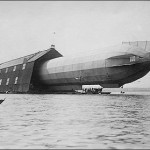 Zeppelin Airships - On July 2, 1900, the first Zeppelin airship took its maiden flight over the Lake Constance near Friedrichshafen. Its creator, Count Ferdinand von Zeppelin, spent two years and all his resources to build the giant – 125 m in length and about 12 m in diameter – cigar-shaped airship equipped with two 14.7 hp Daimler […]
Zeppelin Airships - On July 2, 1900, the first Zeppelin airship took its maiden flight over the Lake Constance near Friedrichshafen. Its creator, Count Ferdinand von Zeppelin, spent two years and all his resources to build the giant – 125 m in length and about 12 m in diameter – cigar-shaped airship equipped with two 14.7 hp Daimler […]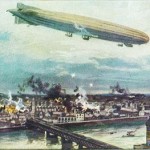 Zeppelins the Bombers - Zeppelins became the frightful reality of WWI. The huge ships carried and dropped the bombs on France and Britain, and there was no defense against the midnight raids of the monsters. The cruising speed of the zeppelins was comparable to the airplanes of the enemies, and the great area allowed lots of guns bristling out […]
Zeppelins the Bombers - Zeppelins became the frightful reality of WWI. The huge ships carried and dropped the bombs on France and Britain, and there was no defense against the midnight raids of the monsters. The cruising speed of the zeppelins was comparable to the airplanes of the enemies, and the great area allowed lots of guns bristling out […]


